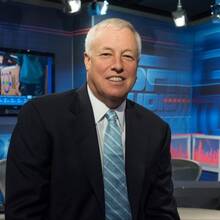“Nothing could be finer than a crisis that is minor in the morning.” This spoof of the verses of “Carolina in the Morning” was one of Charles Osgood’s daily gifts to us via “The Osgood File” on over 400 radio stations along the CBS Radio Network each morning on our commute to work. (He later used it as the title of a book.) The announcement of his passing on Jan. 23 at the age of 91 hit me like it did so many people: A good friend is gone. That is how good radio works. One friend, talking to another.
I got to know Charlie, as we called him, when I was a young sales executive at the CBS Radio Network in the early 90’s. He was already famous, an Emmy Award-winning journalist (five times!) who hosted the above-mentioned “The Osgood File” on radio and would later also host “CBS Sunday Morning” for more than two decades. His obituary from the Associated Press called him “ CBS News’ poet-in-residence.”
Jesuit education instills values of empathy and service. Charles Osgood didn’t miss that class: Those values ran deep in him.
I remember getting on a Delta Shuttle with him at LaGuardia Airport in New York to go up to Boston to visit with Dr. Amar Bose, the founder of the Bose Corporation. We were talking to them about a sponsorship of “The Osgood File” by Bose Wave Radio. At first I was a bit nervous, seated next to someone I already considered a broadcasting legend. But I soon learned that the magic that made him so likable on the radio was not magic at all. He was just who you thought he was, warm, engaging and above all else, authentic.
I do not throw that term “authentic” around lightly. As someone who has been in the media and entertainment business now for over four decades, I can tell you that trait is a rarity.
Charlie closed the deal with Dr. Bose that day, and we began a decade-long friendship that bonded over love of music and good radio.
The announcement of his passing on Jan. 23 at the age of 91 hit me like it did so many people: A good friend is gone.
In no small way, part of who Charlie was came via his Jesuit education at Fordham University, where he graduated in 1954. Jesuit education instills values of empathy and service, promoting civility by emphasizing the inherent dignity of each person. Charlie didn’t miss that class: Those values ran deep and long in him.
Charlie was a part of the illustrious alumni crowd of WFUV, the radio station owned by Fordham University. WFUV has birthed many great broadcasting careers, including Mike Breen, Michael Kay and the legendary Vin Scully. Charlie worked there while attending Fordham with, among others, Alan Alda and Jack Haley.
After he graduated from Fordham, Charlie worked as a disc jockey in Washington, D.C. Following a stint in the Army, he helped start WHCT in Hartford, Conn., moving on to ABC Radio in New York in 1963. In 1967, he took a job on the CBS-owned New York news radio station NewsRadio 88. In 1971, he debuted what would become “The Osgood File,” which he would host until 2017. In 1994, he began as a host of “CBS Sunday Morning,” a role he would fill until 2016. In 1990, he was inducted into the National Association of Broadcasters Hall of Fame.
His generosity was as large as his appetite. Every summer, he and his wife Jean would host a summer picnic for all the employees of CBS Radio and their families at their lovely home in Englewood Cliffs, N.J., not far from the George Washington Bridge. I remember how excited everyone would be when they received that annual summer invite. That was another thing about Charlie: He took the time to get to know the assistant to the assistant as well as all the c-suite execs and everyone in between.
Even after I moved on from CBS, I never forgot my time with Charles Osgood and the lessons I learned from him. He became synonymous with Sunday mornings with his work on “CBS News Sunday Morning,” but the high visibility and bright lights of television did not change him as it has many. We would run into each other often at the New York Athletic Club, where he worked out regularly. We would enjoy a smile and a laugh, talk about the radio business and then get back to the business of working out. He remained as he always was: warm, engaging and authentic.
His passion was always radio—and he would sign off by telling listeners: “I’ll see you on the radio.” It was fitting: Radio is a warm medium, one tailor-made for a warm man.
Includes reporting from the Associated Press.








